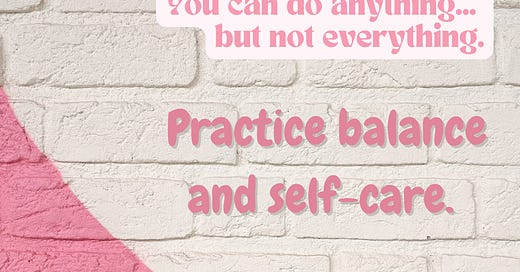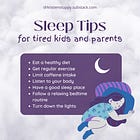Yesterday I shared about the importance of self-care on teen brains. Self-care is more than just taking a break or treating yourself — it’s a crucial practice for maintaining mental, emotional, and physical well-being. For teens with ADHD, self-care can be a game-changer. They cannot achieve control of ADHD symptoms with medication alone. Self-care helps to provide the tools needed to cope with daily challenges, manage stress, and thrive.
Recently I’ve seen several burnt-out teens who have struggled under the pressure of too many honors/AP classes. They also tend to be active in sports and other extracurriculars, so they cut out sleep and other self-care time to fit everything in. We really have to start limiting how many of these classes kids can take (but that’s beyond what I can cover here). Because others do it, they all think they can and should do it so they look good on college apps, but the reality is they are all negatively impacting their physical and mental health by doing so — even the kids who seem to be doing well. They do well until they crash.
I often say, “you can do anything, but not everything!” Choose what’s most important and do those things. Do them well. If you try to do it all, you can’t do anything well without taking something away — and too often what’s removed is sleep, exercise, eating well, or other self-cares.
Let's explore why self-care matters and how it can especially benefit teens navigating ADHD.
The Importance of Self-Care
Self-care refers to intentional activities and habits that support our overall well-being. It involves getting enough sleep, participating in physical activities, eating nutritious foods, and finding time for hobbies and relaxation. While it is essential for everyone, self-care holds extra significance for individuals with ADHD.
If you missed my last post on how lack of self-care affects teen brains, check it out!
7 Reasons for Teens to Practice Self-Care
We all need to practice self-care, but many teens forego self-care to get all the things they think are necessary to be their best — to be competitive for scholarships, to get into the best college, to be the best athlete — whatever their personal goals are. Unfortunately, when they try to do it all, they must take away from something (often sleep) to h…
ADHD affects the brain's ability to regulate attention, impulses, and emotions, leading to difficulties with focus, organization, and time management. Teens with ADHD may also be more susceptible to anxiety, stress, and low self-esteem. When you look at it like this, it’s easy to see that self-care isn’t just about indulgence — it’s about maintaining a balance that enables teens to manage symptoms, stay resilient, and reach their full potential. (And for adults out there, it’s important for us too!)
Benefits of Self-Care for Teens with ADHD
Boosts Emotional Regulation
Teens with ADHD often struggle with emotional regulation, making it hard to manage strong emotions like frustration, anger, or sadness. Self-care practices such as mindfulness meditation, journaling, or engaging in creative hobbies can help teens tune into their feelings and process emotions in healthy ways. Taking time to reflect and relax can create a buffer against overwhelming emotions, helping to reduce the frequency and intensity of emotional outbursts.
Enhances Focus and Productivity
ADHD makes it difficult to stay on task, especially in environments where distractions are plentiful. Self-care routines that include regular breaks, exercise, or structured time for relaxation can help teens recharge their mental batteries. Activities like yoga or even a brisk walk can boost the brain's dopamine levels, improving focus and concentration. Teens who regularly practice self-care may find that they can tackle schoolwork and other responsibilities with more energy and motivation.
Reduces Stress and Anxiety
Stress is a natural part of life, but it can be particularly overwhelming for teens with ADHD who may already struggle with feeling "out of control." Self-care helps manage stress levels by providing tools to calm the nervous system, such as deep breathing exercises, physical activities, or even listening to music. By incorporating relaxation techniques into their routine, teens can build resilience against the stressors they face at school, home, or in social situations.
Improves Sleep Quality
Many teens with ADHD experience sleep difficulties, including trouble falling asleep, staying asleep, or waking up too early. Self-care routines that promote good sleep hygiene—like setting a regular bedtime, reducing screen time before bed, or practicing calming activities in the evening—can significantly improve sleep quality. Getting enough rest is vital for managing ADHD symptoms, as sleep deprivation can worsen attention, memory, and mood problems.
Builds Self-Esteem and Confidence
Teens with ADHD may often receive negative feedback about their behavior or performance, which can impact their self-esteem. Self-care can be a way to show kindness and acceptance toward oneself. When teens make time for activities that bring them joy and fulfillment, it reinforces a positive self-image and builds self-worth. It sends a message that their well-being matters and that they deserve to prioritize their needs.
Practical Self-Care Tips for Teens
To make self-care more accessible and effective, teens should focus on small, manageable changes that can be consistently maintained.
Here are some quick self-care strategies that are particularly beneficial for teens — I’ll focus on each of them more over the upcoming weeks:
Set Daily Routines: Structure helps create a sense of predictability and reduces overwhelm. Setting daily routines for tasks such as homework, chores, or relaxation can establish a rhythm and make self-care practices easier to follow.
Practice Mindfulness: Mindfulness exercises, such as breathing techniques or guided meditation, can help teens learn to stay present and reduce impulsivity. Apps like Balance, Headspace, or Calm offer teen-friendly mindfulness practices. Smiling Mind even has practices for young children — the whole family can benefit!
Stay Physically Active: Physical activity can be a fun and powerful way to burn off extra energy, reduce stress, and improve focus. Sports, dancing, or even walking the dog are great options to incorporate movement into daily life. A goal I encourage teens is to move to raise their heartrate for at least 30 minutes 5 days a week (or longer times on fewer days to total 150 minutes each week).
Get Enough Sleep: Create a consistent sleep schedule and a calming bedtime routine to support quality sleep. Avoid caffeine in the afternoon and try to minimize bright screens before bed. There are many more tips in my previous post:
Ask for Help When Needed: Self-care isn't about doing everything on your own. Knowing when to ask for support from friends, family, or a counselor is an important part of taking care of yourself.
Limit Screen Time: Excessive screen time, especially late at night, can interfere with sleep and concentration. Setting boundaries around technology use and engaging in offline activities, like reading or crafting, can be refreshing.
Side note: I just learned of a FABULOUS opportunity for parents to learn in a new ECHO series! I've attended ECHO conferences for pediatricians, and they are always FABULOUS! Each session starts with a short presentation then there’s a group discussion.
This ECHO 4-part series is for caregivers who want to learn more about the risks and benefits of social media and how it impacts youth well-being. They will learn resources and strategies to create healthy screen habits for the whole family.
Don't miss out on this chance to learn and empower yourself with practical tips for managing social media use in your family.
Sign up here -- it's free and online!
Making Self-Care a Priority
It can be easy to overlook self-care, especially when there are so many demands on a teen's time and attention. But making self-care a priority isn't selfish — it’s a necessary step for maintaining well-being and managing ADHD.
When teens learn to integrate self-care practices into their daily lives, they gain more control over their symptoms and set themselves up for success. This is why I titled my theater-themed Director’s Cut Workshop about self-cares “Setting the Stage for Success.” If you want your teen (or if you are a teen who wants) to understand the importance of self-cares and how to make a series of changes to better health, check out this class.
I’ll also be talking about self-cares in the December ADHDKCTeen monthly meeting. These are free and open to the public, generally on the first Tuesday of the month. Join me — and check out the other ADHDKC upcoming events!
Parents and caregivers can support teens by encouraging self-care routines, modeling healthy behaviors, and recognizing the unique challenges of ADHD. Educators can also foster self-care by promoting a balanced workload and understanding the importance of accommodations for students with ADHD. I would love for school counselors to start advising against a heavy load of AP and honor’s classes!
Final Thoughts
Self-care is a powerful tool that helps teens with ADHD navigate the challenges they face and builds a foundation for long-term well-being. By integrating self-care into their routines, teens can improve emotional regulation, enhance focus, reduce stress, and boost self-esteem. It’s about finding small ways to nurture their minds and bodies, empowering them to thrive.
For teens with ADHD, embracing self-care is a proactive way to manage symptoms, build resilience, and create a life that’s not just about coping but flourishing.








